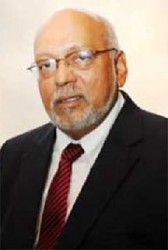In the wake of delays being experienced in the commencement of the disbursement of loans and grants to local micro and small business under the
Micro and Small Enterprise Development (MSED) project funded under the Low Carbon Development Strategy (LCDS), President Donald Ramotar has said that government’s efforts to create an enabling and supportive environment for such development are being negatively affected by “bottlenecks” and “bureaucracy” that “can become frustrating.”
Addressing the 11th Annual General Meeting, of the Small Business Development Finance Trust Inc on Monday last at the Regency Hotel, the President said he was committed to working with the small business sector “to dismantle these bottlenecks wherever they may exist… We need you to bring to our attention the problems that young businesses are facing with the public bureaucracy so that we can sort these out as quickly as possible.”

And while the President did not allude directly to the MSED project which is being administered under the Ministry of Tourism, Industry and Commerce, it is no secret that the key loan and grant components of the US$5 million project, which is being managed by the Small Business Bureau created under the 2004 Small Business Act are yet to be activated.
The bureau’s Chief Executive Officer Derrick Cummings said this week that it was seeking to position itself to provide the best possible service to small business owners in the shortest possible time. He said it was not uncommon for projects of this nature to experience delays beyond their formal launch, pointing out that the procedures and protocols associated with the project having both local and external partners meant that these were often more time-consuming.
Bureaucratic delays apart, President Ramotar restated his government’s view that the biggest single threat to the growth and development of the small business sector is “reliable and cheap electricity.” Calling for the Amalia Falls hydropower project to be addressed quickly, the President said that this “will ensure a cheaper and more reliable supply of electricity.”
Aside from what he said was currently a electricity subsidy bill of “close to $90 million,” President Ramotar said that “cheaper electricity will also mean cheaper production costs for industries and higher profit margins.”





